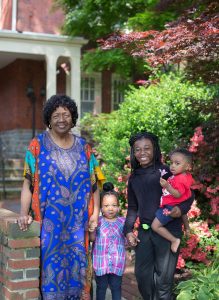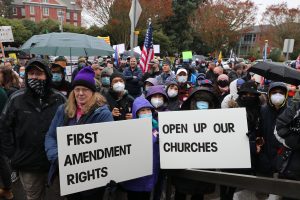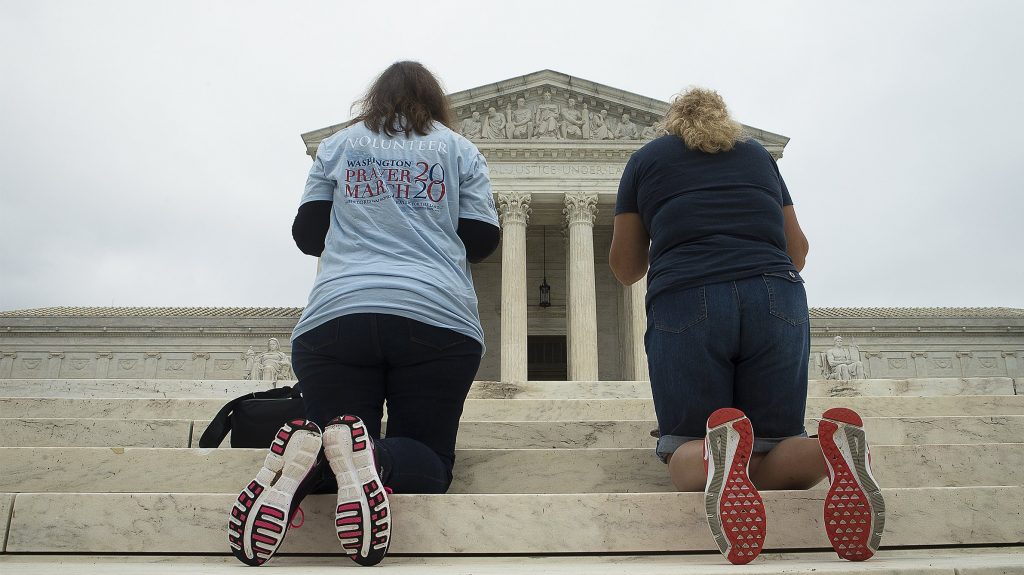Editor's note: This is the sixth of an eight-part year-end backgrounder series on 2020 by Catholic News Service.
History may show that religious liberties under the Donald Trump administration enjoyed an elevated level of support not seen perhaps since the administration of President George W. Bush.
How far and how quickly the religious liberties landscape will change in the coming four years under an expected Joe Biden-Kamala Harris administration remains to be seen. But religious liberty watchers say they are worried.
Daniel P. Dalton, a religious property attorney and co-founder of Michigan-based Dalton + Tomich, which represented a California-based private Catholic school in a contentious campus expansion and renovation effort, sees several key indicators that religious entities will continue to be in the legal and cultural spotlight in 2021.
"From a big perspective, there will be a shift from the current to future administrations in terms of priorities and looking at what is important," Dalton told Catholic News Service, noting U.S. Attorney General Jeff Sessions and then his successor, Bill Barr, both championed religious liberty issues impacting faith traditions, with Sessions creating a Religious Liberty Task Force in 2018.
Critics of the task force characterized the move as the Trump administration politically pandering to white, conservative evangelical Christians and Catholics voters who object to same-sex marriage, birth control and abortion, transgender and LGBTQ rights, and more.
Dalton noted the current director of the Office for Civil Rights at the U.S. Department of Health and Human Services, Roger Severino, reportedly a Catholic, championed a conscience rule making it easier for doctors and health care workers to opt out of performing abortions or other medical procedures and services that violate their conscience.

Severino had argued that previous administrations did not fully enforce existing law that protected health care workers' "conscience rights."
A federal court in Manhattan and other courts challenged that rule, arguing it was far-reaching and gave workers a means to circumvent rules against discrimination.
In 2019, Severino announced a final rule to protect individuals and health care entities from discrimination on the basis of their exercising conscience rights in HHS-funded programs.
He said the rule "ensures that health care entities and professionals won't be bullied out of the health care field because they decline to participate in actions that violate their conscience, including the taking of human life. Protecting conscience and religious freedom not only fosters greater diversity in health care, it's the law."
Dalton told CNS he thinks much will change under proposed incoming HHS director, Xavier Becerra, currently California attorney general, whom pro-life leaders consider an activist for so-called abortion "rights." He also is a leading proponent of the Affordable Care Act and an advocate for containing runaway health care costs.
HHS is the department responsible for administering the ACA, Medicaid and Medicare.
Likewise, another Californian, Vice President-elect Harris -- the first female and first woman of color to be elected vice president -- is seen as highly supportive of the ACA, legal abortion and access to birth control.
"I think we are going to see that we went from one very favorable (administration) to one that will not be -- we will swing back pretty far, but it will take time to see where this will all settle out," Dalton said.
"The deference given to religious organizations in the past are not going to be present in the Biden-Harris administration."
He expects the U.S. Supreme Court to resolve some of the religious liberty disputes, including the on-going dispute involving Catholic Social Services of the Archdiocese of Philadelphia and the city of Philadelphia over the agency declining in 2018 to place foster children with same-sex couples -- a decision based on church teaching upholding traditional marriage.
Earlier this year, the U.S. Conference of Catholic Bishops, the Pennsylvania Catholic Conference and a few Catholic Charities agencies joined more than 30 other religious groups, states and a group of members of Congress in urging the Supreme Court to protect Philadelphia's faith-based foster care.

The case, called Fulton v. Philadelphia, went before the Supreme Court Nov. 4. Whether or not the court allows an exemption -- based on religious beliefs -- to an anti-discrimination law, it will be the most high-profile and important religious liberty court decision expected in 2021, according to a senior counsel at Becket, a religious liberty law firm based in Washington.
"It will shape a lot of religious freedom decisions in the years to come. It will certainly affect foster care ministries across the country but it is a lot bigger than that," said attorney Luke Goodrich, who also is an adjunct professor at the University of Utah's S.J. Quinney College of Law, where he teaches constitutional law.
In 2018, the city of Philadelphia stopped using the foster program of Catholic Social Services of the Philadelphia Archdiocese because the agency will not place children with same-sex couples or unmarried couples because such unions go against church teaching on traditional marriage.
A year later, the U.S. Court of Appeals for the 3rd Circuit sided with the city, calling the agency's policies discriminatory. The move prompted other Catholic Charities agencies around the country with canceled foster care programs to weigh in with their support for an exemption to the anti-discrimination rules.
"The people who are most hurt by Philly's actions are foster children because our clients include foster moms who have empty beds in their homes right now ready to take in kids -- those kids need loving families and they turn them away because of some bureaucrat's ideological agenda," said Goodrich.
He noted that in 100 years of operation, no same-sex couple had ever come to Catholic Social Services in Philadelphia asking the agency for assistance in foster care, so no one was ever turned away from those services.
"If the Supreme Court rules the right way, it will make clear governments aren't allowed to penalize religious organizations because of their beliefs about marriage. It all depends on how the court writes its opinion," he told CNS.
Goodrich also played a role in Becket's representation of the Little Sisters of the Poor through the courts as the order objected on religious grounds to adhere to an ACA mandate they provide contraceptives and abortifacients in their employee health care plan.
The case went to the Supreme Court twice. California, Pennsylvania and other states filed lawsuits against the Little Sisters receiving a broad exemption to the mandate from the federal government, arguing this was federal interference with the states' duty to guarantee women's "reproductive rights."
The religious order ultimately prevailed on July 8 of this year when the Supreme Court ruled 7-2 in their favor in the similar challenge from Pennsylvania.
The ongoing global pandemic and continuing surge in COVID-19 cases in the U.S. also means that religious liberties will continue to come up in the new year as people of faith fight government-mandated closures of houses of worship and severe restrictions the sizes of congregations allowed for public worship.

Just before midnight Nov. 25, on the eve of Thanksgiving, the Supreme Court stopped New York Gov. Andrew Cuomo from imposing discriminatory 10- and 25-person caps on synagogues and churches.
In separate filings with the court, the Diocese of Brooklyn, New York, and two Orthodox Jewish communities objected to the rules and the court agreed the governor's violated the First Amendment's guarantee of religious freedom by treating religious services worse than secular activities.
"This showed that the courts have an important role to play in treating houses of workshop fairly and according to the Constitution during a pandemic," Goodrich said. "That is not the final word on the matter, there are other cases before the Supreme Court right now and we may hear something on that at any moment."
Noting that both New York and California are imposing some of the most severe pandemic-related restrictions on public worship, Goodrich said, "We have been in touch with a number of California entities that have been affected by the lockdowns."

